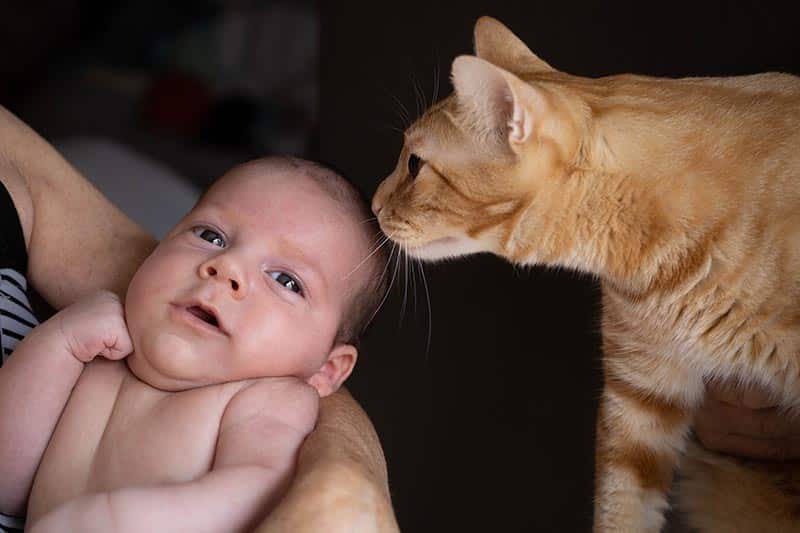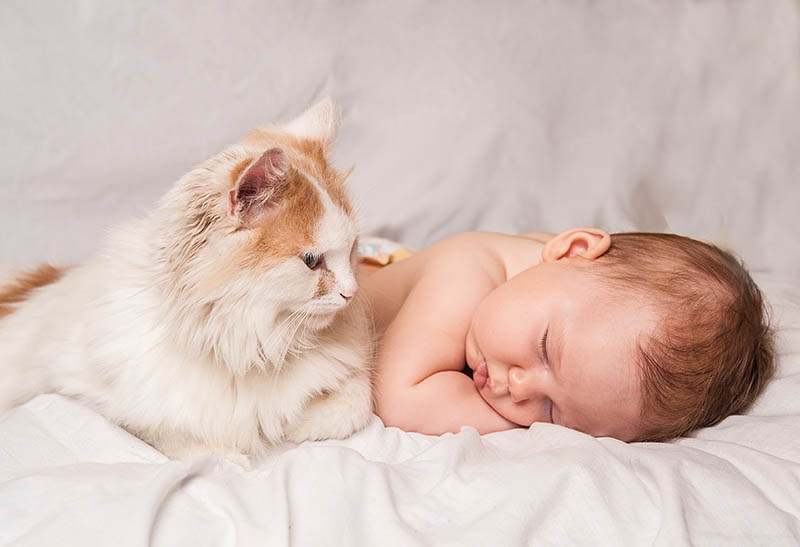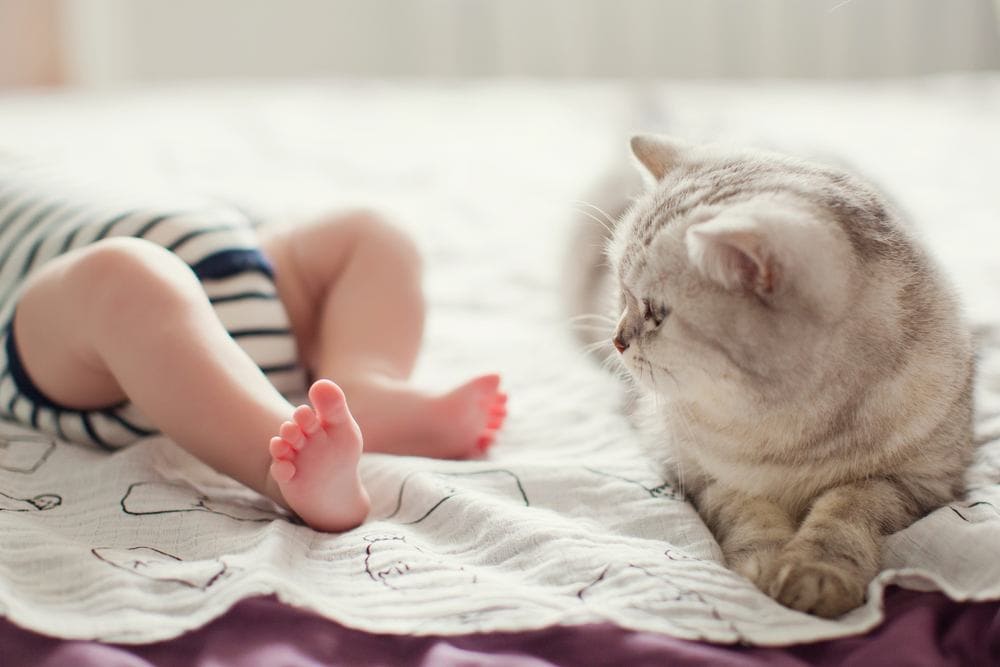If you are bringing a new bundle of joy home from the hospital soon, you might wonder how your feline family member will get along with a newborn. Will they hurt the baby? Worse, can the mere presence of a cat in the home make your baby sick?
Cats can pose multiple potential health risks when you have young children in the home. Keep reading to learn more about the dangers that cats pose to babies and what you can do to minimize your children’s risk.
The 11 Dangers Cats Pose to Babies
There are several dangers cats can inflict on babies, so you want to think about whether having your cat around your baby frequently is a good idea.
1. Infection
Cats can carry many infectious diseases that could be harmful to your baby. These diseases can be passed on to humans through scratching or feces. For example, your baby could develop an infection if you clean the cat’s litter box and then touch your baby or feeding equipment without first washing your hands.
2. Toxoplasmosis
Toxoplasmosis is a real concern for families, especially pregnant people and young children. This infection can cause flu-like symptoms like aches, swollen glands, and fever. To reduce the risk of developing this infection, keep your kitty inside and away from stray cats, use gloves when changing their litter box, and don’t feed them raw meat.

3. Toxocariasis
Toxocariasis is a human illness caused by the Toxocara cati roundworm. Eggs from the roundworm will pass into your cat’s feces and can live for a long time. People, or babies, can swallow these eggs if they touch a contaminated surface. This happens more often in playground-age children, but babies can also develop toxocariasis.
When the eggs are swallowed, they pass into the intestines and hatch into larvae. The larvae will enter the intestinal wall and bloodstream, enabling them to travel to other areas of the body. They can live for months or even years in humans.
4. Cat Scratch Disease
Cat scratch disease (CSD) is a bacterial infection that spreads when an infected cat licks a human’s open wound or they bite or scratch them hard enough to break the skin. The infection can cause fever, headache, exhaustion, and swollen lymph nodes. CSD is caused by a bacterium known as Bartonella henselae, and approximately 40% of cats carry it at some point during their lives. However, most cats infected with the bacterium do not show signs.
5. Parasitic Infections
Fleas are one of the most common external parasites of cats. Their bites can cause itching and inflammation in both humans and cats.
Scabies, an infection from the mange mite, is sometimes found on a cat’s skin. They can be passed from your kitty to you or your baby, where they will burrow into the skin, causing itchiness and raised lesions.

6. Fungal Infections
Ringworm is a common skin infection easily recognizable by the red ring-like rash it produces. It’s caused by direct contact with the group of fungi known as dermatophytes. Cats with ringworm will likely need to be treated with topical and oral therapy.
Unfortunately, ringworm can easily be transmitted to humans, but children are especially vulnerable. Therefore, it is important to wear gloves when handling your infected cat and thoroughly wash your hands after doing any cat-related care.
7. Viral Infections
Rabies is the most well-known viral infection spread through the bite of an infected animal. Although most viruses only infect the natural host species, rabies is an exception.
Cats are especially susceptible to this central nervous system-attacking disease. This condition is almost always fatal. Luckily, rabies is very rare, as the CDC reports. There are typically only one to three cases reported every year. There were only 25 human cases in the U.S. between 2009 and 2018.
It’s important to keep your kitty up to date on their rabies vaccine, even if they’re an indoor cat. Felines can sometimes escape outdoors, and rabies-carrying creatures like bats or raccoons may occasionally enter homes.
8. Suffocation
You mustn’t ever give your kitty access to the room with your sleeping baby inside. You never know when your well-meaning kitty might feel it necessary to snuggle up with this warm human. This can interfere with your baby’s breathing and even suffocate them.
Don’t let your cat sleep on anything that belongs to your baby, including the crib, swing, or bassinet. The sooner you can set these boundaries, the better.

9. Allergies
Up to 20% of adults are allergic to cats, and up to 40% of kids with asthma may develop allergy symptoms when exposed to cats.
Unfortunately, all cats, even hairless ones, produce allergens. When they groom themselves, proteins in their saliva are deposited on their skin and fur, which can then easily spread wherever your kitty wanders.
10. Bites & Scratches
Cat bites and scratches can cause CSD if your kitty has the Bartonella henselae bacterium. But even if your kitty doesn’t have the infection, bites and scratches can still be harmful to your baby because they hurt. Between 50% and 80% of cat bites on humans are serious enough to seek medical attention.
If your pet scratches or bites your baby, wash the wound under warm, running water even if the skin didn’t break during the attack. Cats have a lot of bacteria in their mouths that you don’t want to be transferred to your baby. For example, Pasteurella multocida is found in the mouths of up to 90% of cats. Bites from cats infected with this organism can develop swelling, redness, and pain within the first 24 to 48 hours. They often need to be treated with antibiotics to prevent more serious complications.
11. Salmonella Poisoning
Salmonella poisoning, or salmonellosis, causes symptoms like fever, diarrhea, and stomach pain. This is most often contracted from eating food contaminated with the Salmonella bacteria, but it’s possible to get the disease from infected cats.
How to Keep the Baby Safe Around Your Cat
You don’t need to rehome your cat just because you’re bringing home a newborn. Let’s look at what you can do to ensure that the transition home is harmonious and safe.
Have Constant Supervision
Never leave your newborn in a room alone with your cats unsupervised. As much as you think you know your cat’s personality inside and out, they can still be unpredictable. They may have never lashed out at you, but you also likely don’t scream and cry all day and night or smell like pee or poop all the time.

Provide a Safe Place for Kitty
You should also give your kitty a safe, baby-free place to retreat when needed. If you have kids already, you know how overstimulating a newborn can be (and if you’re a first-time parent, you’ll soon find out). You are capable of understanding that babies crying is just a normal part of parenthood, but your cat has no way of knowing that. Having their own sanctuary to retreat to when they’re overstimulated will give them a place to cool down when things get loud.
Prepare Kitty in Advance
A newborn throws a wrench into your kitty’s predictable life. Your pet won’t be used to the new smells and sounds that accompany a baby, so the more preparation you can do before the baby is born, the better.
Play recorded sounds of babies crying so your cat will not be as startled when they hear this sound every day. Turn on your baby’s electronic devices (e.g., infant swings) for several minutes daily.
Bring out some of your baby’s clothing to allow your pet to sniff them. Even once your baby comes home, you can leave out an article of their clothing for your kitty to get more accustomed to their scent.
Even if your cat is your fur baby, consider handing over some of their daily care tasks to your partner. This will hopefully help prevent feelings of jealousy that your kitty may develop once your baby is home, as they won’t think that you’re rejecting them if your partner takes care of your typical cat-related tasks.
Spend Time With the Cat
Your attention will be solely focused on the tiny human you brought home from the hospital for the first several months of their life. So, you will need to set aside some time every day to spend with your kitty without the baby in tow. Your pet will appreciate having your undivided attention, which may make them less likely to feel abandoned or lash out aggressively.

Final Thoughts
Cats can pose health risks to newborn babies and children, but with proper hygiene and care, the chances are minimal. Make sure you wash your hands after petting your cat and changing their litter box. Don’t let your cat come too close to your baby when you’re not actively supervising. Stay up to date on your kitty’s vaccines. If you notice them exhibiting any strange behaviors, take them to the vet sooner rather than later to rule out any potentially contagious conditions.
Featured Image Credit: aprilante, Shutterstock
Contents
- The 11 Dangers Cats Pose to Babies
- 1. Infection
- 2. Toxoplasmosis
- 3. Toxocariasis
- 4. Cat Scratch Disease
- 5. Parasitic Infections
- 6. Fungal Infections
- 7. Viral Infections
- 8. Suffocation
- 9. Allergies
- 10. Bites & Scratches
- 11. Salmonella Poisoning
- How to Keep the Baby Safe Around Your Cat
- Have Constant Supervision
- Provide a Safe Place for Kitty
- Prepare Kitty in Advance
- Spend Time With the Cat
- Final Thoughts












